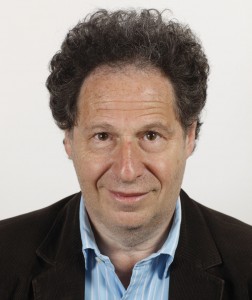Interview with Professor Saul Estrin, LSE
In today’s fast-changing global environment, business leaders need new tools to face new challenges like never before. Innovation is one such tool. Here, we pick Professor Saul Estrin’s brain about how LSE’s Department of Management is preparing the business executives of today for the challenges they may face tomorrow.
LSE’s Executive Global Masters in Management (EGMiM) seeks to turn students into “innovative industry leaders”; why do you think innovation is so key in today’s business environment?
Innovation is increasingly important for businesses to embrace in order to survive and succeed in today’s global business environment, not least to keep up with competitors. The context in which businesses of all sizes operate is changing ever more rapidly, with technological advances meaning both opportunities and threats are emerging more quickly than ever, and social, political and economic trends in one region have a more fast-moving ripple effect on markets across the globe. Businesses therefore need to adapt quickly and effectively to change, and continuous innovation is key to this evolutionary process. Managers and leaders within businesses need to drive this change, and we therefore place great importance on teaching our students on the EGMiM programme the critical thinking and theoretical grounding they will need to understand and critically analyse new challenges throughout their lifelong careers, and to lead in establishing innovative solutions to these challenges.
Tell us a little more about your take on innovation – why is it so crucial in your executive education programmes?
A key priority for today’s managers and leaders must be to drive innovation within their organisation, in order for their business to remain viable and competitive. Therefore we see this as a crucial priority in our portfolio of executive programmes, and both the EGMiM and TRIUM Global EMBA are designed to sharpen students’ intellectual ability and practical experience to create innovative solutions to future business challenges. The TRIUM programme gives executives the intellectual space, resources, and mandate to strike out in a new direction – the opportunity to take their vision, expertise and experience and develop an innovative idea from inception to launch in the TRIUM Capstone Project. The EGMiM also offers a Capstone Project as part of the core curriculum, enabling students to focus on establishing an innovative solution to a real business problem, either in their current job role, or to launch a new entrepreneurial venture.
Leadership is a key component throughout both the EGMiM and TRIUM Global Executive MBA (EMBA); how do these programmes develop strong leaders?
The Executive Global Masters in Management and TRIUM Global EMBA programmes complement each other in our executive education portfolio, as they are each designed to target business professionals at different stages of their careers – EGMiM is ideal for outstanding working professionals with a minimum of 3 years’ experience, while TRIUM, ranked #1 EMBA in the world by the Financial Times, is designed for the globe’s top level senior executives with 10-15 years’ experience. But both programmes share the common aim of developing skilled and innovative business leaders through both the core cutting-edge curriculum, and also first-hand experience of a rich range of global business cultures with a diverse group of international classmates and teaching modules in carefully chosen international locations.
The EGMiM programme focuses particularly on academically rigorous “LSE-style” learning to develop our students’ foundations of leadership practice, and understanding of the real socio-economic and geo-political context of global business, as a grounding to boost them to a high-level leadership career. The TRIUM programme attracts a diverse group of people who have already excelled in their careers as senior leaders, but want to be challenged further. The focus lies in bringing them into the exclusive network of 3 leading business schools, and enabling them to develop their strategic vision and collaborate with like-minded peers from a wide range of industries and international backgrounds, to develop their success as global leaders.
As you say, your executive education programmes combine the theoretical with the practical; why is this synthesis so important for cultivating effective leadership?
The LSE’s founding mission is the pursuit of knowledge for the purpose of practical benefit to society, focusing not only on world-leading academic study, but also its application in the real world. Our executive programmes are designed closely around this ethos, and in both the EGMiM and TRIUM programmes we provide a carefully designed balance between academic classroom learning and practical learning with exposure to real-world global business. The TRIUM faculty are not only superb teachers, but they are also actively engaged in the business life of their home cities, advising local companies and, through their research, generating the knowledge that shapes international business theory and practice, and the impact is immediate for our students. On the EGMiM programme, learning from the classroom is designed to be directly applied to real-world issues faced by each individual student in the workplace, as they continue to work full-time throughout the programme. This adds instant tangible career benefits from day one.
What makes LSE’s executive programmes in this field unique?
In addition to our location in the heart of London and our exceptionally internationally diverse students and faculty, the LSE is unique in offering executive management programmes from the perspective of a world-leading university specialising in social sciences, rather than a traditional business school. Our programmes draw learning from a broader range of social science disciplines, including economics, politics and sociology, as well as the more traditional core business disciplines (management, accounting and finance). In addition to an outstanding training in the core areas of management and leadership which is common to all leading executive business programmes, the LSE learning environment also gives our students a unique understanding of the real geo-political and socio-economic contexts which fundamentally underpin the success or failure of businesses across the world, which is a huge advantage when it comes to being able to deal with the inter-connected nature of the real business world, where problems do not occur in neatly divided subject areas, but instead can be most effectively approached with a cross-disciplinary understanding of the full range of contextual factors.
As you say, diversity is a key facet of LSE’s executive programmes in management; what role do you think diversity plays in driving innovation?
What other benefits do students gain from the global nature of LSE’s executive management programmes?
In addition to exposure to diversity in global business practice from their connections in the classroom and on location at international modules, our students on both the EGMiM and TRIUM programmes also benefit from a strong foundation in global business from the academic curriculum. Both programmes take a rigorous approach to learning, not just focused on long-established Western business and developed economies, but also on emerging markets and globalisation which are increasingly the world’s areas of opportunity for growth and thriving business. Core courses on both the EGMiM and TRIUM are taught by international faculty who bring a diverse mix of global experience and expertise to the classroom, and this global approach across all aspects of learning equips students with the experience and understanding they will need to manage and lead their businesses in an international working environment.
Recent years have seen dramatic power shifts in the global marketplace; what opportunities and challenges does this open up for executives?
Not only are the largest markets changing, as indicated by the rise of China and the other BRICs, and more recently by the MINTs, but the world economy is rebalancing. Rather than a small number of major markets and a periphery of numerous smaller ones, we increasingly see a global market place with a large number of approximately equal sized markets. The opportunities this opens up are clear. Firms are able to exploit ever increasing scale economies by operating in more and more countries and locations. A given firm’s specific advantage – a resource, patent, innovation, technology or brand – can be exploited across larger and larger markets. But also this brings some real problems. First, the firm has to be able to manage the vastly increased complexity of operating across so many jurisdictions, business environments and cultures. Managerial systems have to be supple, open to change and learning and effective in the face of enhanced complexity. The second major issue is that firms may face competition from sources they have not previously considered. Not only from the innovative activities of rival firms that may change the underlying business model of their industry, but also from the fact that new competitors may emerge from countries that do not at the moment appear to offer competitive threats.
Different global markets inevitably pose different management and leadership challenges; how do you prepare students to navigate these challenges?
We try to give our students an analytical framework which allows them to understand the way that the global economy and local business environment operates, as well as the ways in which it is changing. Thus we try to understand what factors drive underlying long-term growth in a country; not only the economic factors – innovation, savings, capital markets, education, skills, health – but also the institutional factors, such as the quality and effectiveness of the legal system, the efficiency of the state, and of course the determinants and cures for corruption. We don’t just teach students facts – what is going on now – because that is rapidly going to change. We try to get them to understand what factors drive the changing business context. But we also do explain to them where to obtain the facts and data that indicate how these changes are occurring. In our teaching, we rely on senior business speakers, widespread use of international case studies, and international classroom modules located in emerging market economies where we visit government agencies, universities and think tanks and of course numerous companies, to give students a real understanding of how the analytical frameworks, the data and the situation on the ground combine to explain the business context in particular countries.
Finally, what are your top tips for successful leadership today?
About the Interviewee
 Saul Estrin is Professor of Managerial Economics and Strategy in the Department of Management at the London School of Economics, where he was the founding Head of Department for seven years. He established the department’s flagship Master’s in Management, and is now EGMiM Programme Director and TRIUM Vice Dean. He was also formerly Deputy Dean and Acting Dean at London Business School. His areas of research include international business, economic development and entrepreneurship. He is best known for his work on privatisation and foreign direct investment.
Saul Estrin is Professor of Managerial Economics and Strategy in the Department of Management at the London School of Economics, where he was the founding Head of Department for seven years. He established the department’s flagship Master’s in Management, and is now EGMiM Programme Director and TRIUM Vice Dean. He was also formerly Deputy Dean and Acting Dean at London Business School. His areas of research include international business, economic development and entrepreneurship. He is best known for his work on privatisation and foreign direct investment.





































